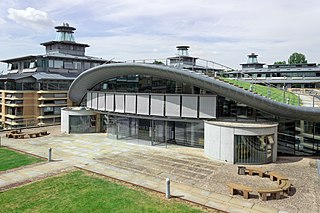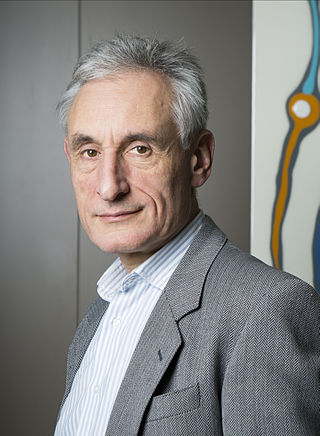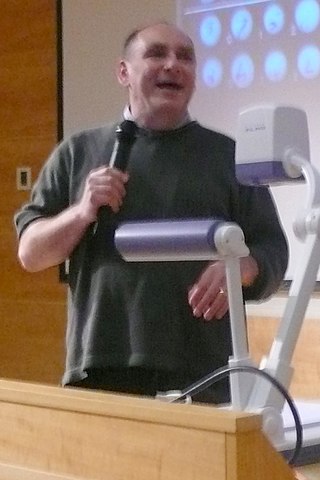
Kevin Warwick is an English engineer and Deputy Vice-Chancellor (Research) at Coventry University. He is known for his studies on direct interfaces between computer systems and the human nervous system,and has also done research concerning robotics.

Dabbala Rajagopal "Raj" Reddy is an Indian-American computer scientist and a winner of the Turing Award. He is one of the early pioneers of artificial intelligence and has served on the faculty of Stanford and Carnegie Mellon for over 50 years. He was the founding director of the Robotics Institute at Carnegie Mellon University. He was instrumental in helping to create Rajiv Gandhi University of Knowledge Technologies in India,to cater to the educational needs of the low-income,gifted,rural youth. He was the founding chairman of International Institute of Information Technology,Hyderabad. He is the first person of Asian origin to receive the Turing Award,in 1994,known as the Nobel Prize of Computer Science,for his work in the field of artificial intelligence.

Barbara Liskov is an American computer scientist who has made pioneering contributions to programming languages and distributed computing. Her notable work includes the introduction of abstract data types and the accompanying principle of data abstraction,along with the Liskov substitution principle,which applies these ideas to object-oriented programming,subtyping,and inheritance. Her work was recognized with the 2008 Turing Award,the highest distinction in computer science.

Henry Samueli is an American businessman,engineer,and philanthropist.

The Faculty of Mathematics at the University of Cambridge comprises the Department of Pure Mathematics and Mathematical Statistics (DPMMS) and the Department of Applied Mathematics and Theoretical Physics (DAMTP). It is housed in the Centre for Mathematical Sciences site in West Cambridge,alongside the Isaac Newton Institute. Many distinguished mathematicians have been members of the faculty.

Andrew Blake FREng,FRS,is a British scientist,former laboratory director of Microsoft Research Cambridge and Microsoft Distinguished Scientist,former director of the Alan Turing Institute,Chair of the Samsung AI Centre in Cambridge,honorary professor at the University of Cambridge,Fellow of Clare Hall,Cambridge,and a leading researcher in computer vision.

Yann AndréLeCun is a Turing Award winning French-American computer scientist working primarily in the fields of machine learning,computer vision,mobile robotics and computational neuroscience. He is the Silver Professor of the Courant Institute of Mathematical Sciences at New York University and Vice-President,Chief AI Scientist at Meta.

Jonathan Andrew Crowcroft is the Marconi Professor of Communications Systems in the Department of Computer Science and Technology,University of Cambridge,a Visiting Professor at the Department of Computing at Imperial College London,and the chair of the programme committee at the Alan Turing Institute.

The Turing Institute was an artificial intelligence laboratory in Glasgow,Scotland,between 1983 and 1994. The company undertook basic and applied research,working directly with large companies across Europe,the United States and Japan developing software as well as providing training,consultancy and information services.

Fei-Fei Li is a China-born American computer scientist,known for establishing ImageNet,the dataset that enabled rapid advances in computer vision in the 2010s. She is the Sequoia Capital professor of computer science at Stanford University and former board director at Twitter. Li is a co-director of the Stanford Institute for Human-Centered Artificial Intelligence and a co-director of the Stanford Vision and Learning Lab. She served as the director of the Stanford Artificial Intelligence Laboratory from 2013 to 2018.

Yoshua Bengio is a Canadian computer scientist,most noted for his work on artificial neural networks and deep learning. He is a professor at the Department of Computer Science and Operations Research at the Universitéde Montréal and scientific director of the Montreal Institute for Learning Algorithms (MILA).
Maryellen L. Giger, is an American physicist and radiologist who has made significant contributions to the field of medical imaging.
Animashree (Anima) Anandkumar is the Bren Professor of Computing at California Institute of Technology. Previously,she was a senior director of Machine Learning research at NVIDIA and a principal scientist at Amazon Web Services. Her research considers tensor-algebraic methods,deep learning and non-convex problems.
Emily Mower Provost is a professor of computer science at the University of Michigan. She directs the Computational Human-Centered Artificial Intelligence (CHAI) Laboratory.
Julia A. Schnabel is Professor in Computational Imaging and AI in Medicine at Technische Universität München,Director of the Institute of Machine Learning in Biomedical Imaging at Helmholtz Zentrum München,and Chair of Computational Imaging at the School of Biomedical Engineering and Imaging Sciences at King's College London. Previously,she was Associate Professor in Engineering Science at University of Oxford where she became Full Professor of Engineering Science in 2014.
Danijela Branislav Cabric is a Serbian-American electrical engineer. She is a professor in the Department of Electrical and Computer Engineering at the University of California,Los Angeles. In 2021,Cabric was elected a Fellow of the Institute of Electrical and Electronics Engineers (IEEE) for her "contributions to theory and practice of spectrum sensing and cognitive radio systems."
Athina Markopoulou is a Greek-American engineer who is Professor,Chancellor's Fellow,and chair at the University of California,Irvine. Her research considers internet privacy,data transparency and mobile data analytics. She was elected Fellow of the Institute of Electrical and Electronics Engineers in 2020.
Lara Dolecek is an American coding theorist known for her work on low-density parity-check codes. She works in the UCLA Henry Samueli School of Engineering and Applied Science as a professor of electrical and computer engineering and area director for signals and systems.

The TUM School of Computation,Information and Technology (CIT) is a school of the Technical University of Munich,established in 2022 by the merger of three former departments. As of 2022,it is structured into the Department of Mathematics,the Department of Computer Engineering,the Department of Computer Science,and the Department of Electrical Engineering.












